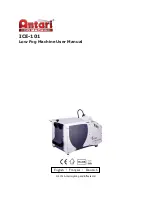
CHANGING THE NEEDLE
G
etting
Re
ad
y
37
1
■
About the Needle
The sewing machine needle is probably the most important part of the sewing machine. Choosing the proper
needle for your sewing project will result in a beautiful finish and fewer problems. Below are some things to keep
in mind about needles.
• The smaller the needle number, the finer the needle. As the numbers increase, the needles get thicker.
• Use fine needles with lightweight fabrics, and thicker needles with heavyweight fabrics.
• To avoid skipped stitches, use ball point needle (gold colored) 90/14 with stretch fabrics.
• To avoid skipped stitches, use ball point needle (gold colored) 90/14 when sewing character or decorative
stitches.
• Use a 90/14 to 100/16 needle with transparent nylon threads, regardless of the fabric being sewn.
• A home sewing machine needle 75/11 is inserted in the sewing machine.
■
Fabric/Thread/Needle Combinations
The following table provides information concerning the appropriate thread and needle for various fabrics.
Please refer to this table when selecting a thread and needle for the fabric you wish to use.
Fabric
Thread
Size of needle
Type
Size
Medium weight fabric
Broadcloth
Cotton
60 - 80
75/11 - 90/14
Taffeta
Synthetic mercerized
60 - 80
Flannel, Gabardine Silk or silk finished
50
Lightweight fabric
Lawn, Batiste
Cotton
60 - 80
65/9 - 75/11
Georgette
Synthetic mercerized
60 - 80
Challis, Satin
Silk
50
Heavyweight fabric
Denim
Cotton
30 - 50
90/14 - 100/16
Corduroy
Synthetic mercerized
50
Tweed
Silk
50
Stretch fabric
Jersey
Thread for knits
50 - 60
Ball point needle
(gold colored)
75/11 - 90/14
Tricot
Easily frayed fabrics
Cotton thread
50 - 80
65/9 - 90/14
Synthetic thread
Silk thread
50
For top stitching
Synthetic mercerized
30
90/14 - 100/16
Silk
30
Memo
For transparent nylon thread, always use needle 90/14 - 100/16.
The same thread is usually used for the bobbin thread and upper threading.
CAUTION
• Be sure to follow the needle, thread, and fabric combinations listed in the table. Using an improper combination,
especially a heavyweight fabric (i.e., denim) with a small needle (i.e., 65/9 - 75/11), may cause the needle to bend or
break, and lead to injury. Also, the seam may be uneven, the fabric may pucker, or the machine may skip stitches.
Summary of Contents for Innov-is QC1000
Page 9: ...8 ...
Page 51: ...USEFUL FUNCTIONS 50 ...
Page 101: ...SEWING THE STITCHES 100 ...
Page 119: ...COMBINING STITCH PATTERNS 118 Examples of Pattern Combinations ...
Page 137: ...USING STORED CUSTOM STITCHES 136 ...
Page 162: ...English 882 U60 XE0783 001 Printed in Taiwan Operation Manual 882 U60 ...
















































